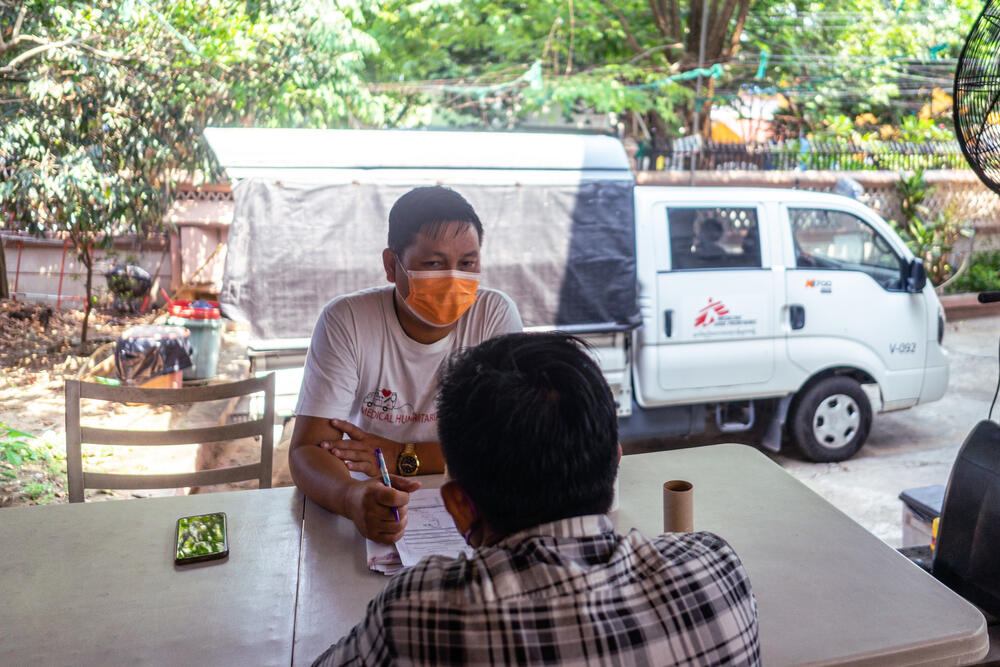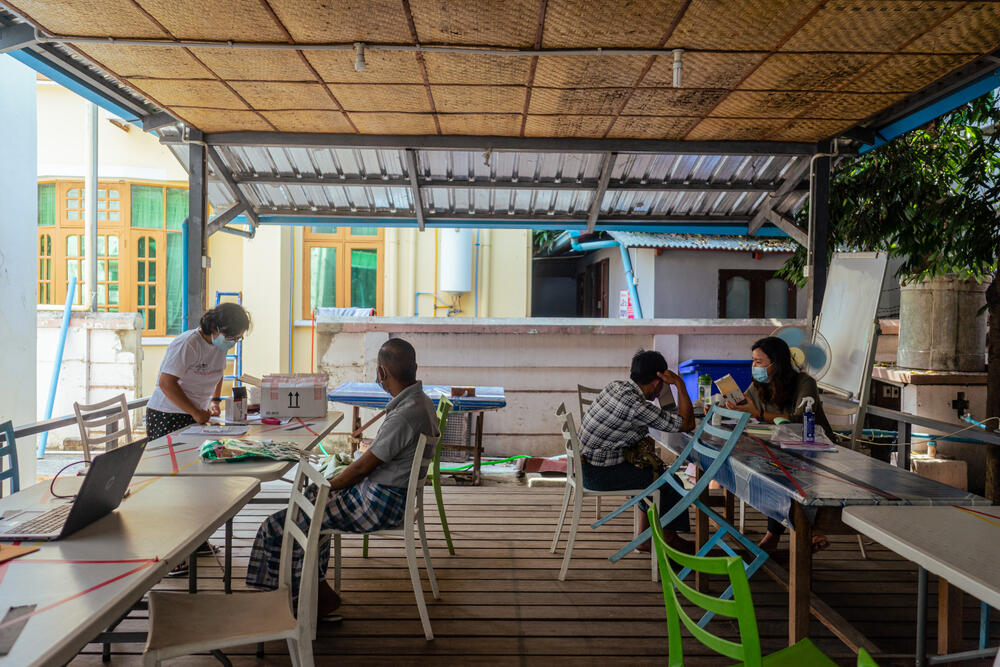Myanmar: Attacks and intimidation put healthcare services at risk
As Myanmar approaches four months of military rule, public healthcare remains severely disrupted.
Many hospitals and clinics are closed or occupied by the military, and those that are open have limited services available while medical staff are on strike. MSF teams working in Myanmar have few options for referring people for specialised treatment.
These challenges leave many people struggling to access the healthcare they need.
Now, Médecins Sans Frontières / Doctors Without Borders (MSF) is calling on Myanmar’s de facto military government and other groups to take all steps to ensure people have safe and unhindered access to healthcare regardless of where they seek it. Equally, medical staff must be able to provide life-saving care without attacks, detention or intimidation.
If a wave of new COVID-19 infections grips Myanmar, it will be a public health disaster given the country’s capacity to test, treat and vaccinate is a fraction of what it was before the military seized power.
Shutdown by security forces
Patients are forced to choose between seeking treatment at a private facility they may not be able to afford, or at a military-controlled hospital where their safety could be at risk – particularly if they have been involved in protests or the civil disobedience movement.
“If the security forces at the checkpoints don’t let the patients pass, what can the medical personnel do for their patients?”
NGO clinics do exist in some places, but they are unable to cover all needs and have had their activities restricted by the military authorities.
An MSF-supported clinic was told by security forces it could not treat protesters. The authorities visited the facility, ordered the emergency beds removed and insisted all injured people be taken to the military or military-controlled hospitals.
Police also arrested one of the clinic's volunteer for being involved in protests and demanded names and addresses of others working there. The facility was forced to temporarily close and is now barely functioning, operated by a skeleton staff.
Violence against healthcare staff
Patients in Myanmar are forced to travel further to get care at a time when risks are much greater. Security forces at checkpoints scrutinise those moving around, search their belongings, intimidate them and contribute to a climate of fear.
For patients with conditions requiring regular and long-term care, such as HIV, tuberculosis and hepatitis C, the ongoing insecurity and delays in accessing medicines could be life-threatening.
“What patients are worried about now is if they can access the clinic to get medication,” an MSF doctor in Kachin state said.
“If the security forces at the checkpoints don’t let the patients pass, what can the medical personnel do for their patients?”
Doctors and nurses continue to be targets of violence. Staff working in medical facilities that MSF has provided support to have shared reports of medical staff being arrested and detained.

Help us prepare for the next emergency
There have been 179 attacks on healthcare staff and facilities since the start of the military takeover, killing 13 people, according to the World Health Organization's Surveillance System of Attacks on Healthcare.
Media reports have shown emergency medical workers and first responders on the frontlines of peaceful protests being shot at with live rounds while trying to help the wounded. MSF partners have also witnessed raids on organisations providing first aid to injured protesters, and their supplies destroyed.
Economic fallout
As the public health system in Myanmar deteriorates, its economy is also collapsing.
Cash is increasingly difficult to obtain, with people facing huge queues at sporadically filled ATMs. The kyat has fallen 17 percent against the dollar, pushing up the cost of imports and goods like cooking oil, rice and fuel.
Humanitarian agencies are not immune to this crisis. Facing shortfalls in cash and increased costs can prevent organisations, including MSF, from buying supplies and medications, paying staff salaries and moving goods around.
We are already seeing the impact of this in our HIV programme in Kachin state. Before 1 February, MSF had been gradually transferring our HIV patients to the government's National AIDS Programme.
However, these clinics are no longer open and MSF has seen nearly 2,000 patients return to our facilities for consultations and drug refills, and over 200 new HIV-positive patients register.
In Rakhine state, water and sanitation have long been a problem in the camps holding many of the country’s Rohingya minority, who rely on humanitarian aid.
Now that many organisations are scaling back their activities as they struggle to access cash and get supplies into the camps, we are seeing a spike in people seeking treatment for conditions such as acute watery diarrhoea.
Reignited conflict and crisis
An estimated 60,000 people have been displaced within Myanmar and 10,000 more in neighbouring countries since the 1 February seizure of power, according to data from the United Nations’ refugee agency, UNHCR.
This is largely due to a resurgence of conflict in Myanmar’s borderlands, particularly in Chin, Kachin and Kayin states—predominantly between the military and ethnic armed groups, but increasingly including pro-democracy people’s defence forces.
Airstrikes and shelling are forcing people to flee their homes and have caused an unknown number of civilian casualties.
In numbers: Our work in Myanmar
163,000
OUTPATIENT CONSULTATIONS BY MSF IN MYANMAR IN 2024
480
PATIENTS STARTED ON TB TREATMENT UNDER DIRECT MSF CARE IN MYANMAR IN 2024
7,140
ANTENATAL CONSULTATIONS BY MSF IN MYANMAR IN 2024
MSF had to withdraw staff from one town in Kachin state due to fighting, temporarily interrupting our services, while the sound of shelling and gunshots are commonplace in several locations. This impacts our activities and staff wellbeing and raises significant concerns for people’s ability to travel to seek healthcare.
Medical staff and humanitarian organisations must be protected from violence and given unhindered access to conflict areas to ensure those at risk can access life-saving care.
MSF fears for the people of Myanmar in this worsening crisis.
All obstacles preventing sick and wounded people from seeking healthcare, including the violence, detainment and intimidation of health workers, must be dismantled.
MSF in Myanmar
Formerly known as Burma, Myanmar is an ethnically diverse country in Southeast Asia, with over 100 ethnic groups.
In August 2017, the Myanmar authorities launched a concerted campaign of violence against the Rohingya people in the country’s Rakhine State, forcing hundreds of thousands of people to flee for their lives.
Médecins Sans Frontières/Doctors Without Borders (MSF) first worked in Myanmar in 1992.
Today, our mobile teams in central Rakhine offer primary healthcare and emergency referrals, despite restrictions on humanitarian access to conflict-affected areas.
In other parts of Myanmar, we treat people with HIV and co-infections associated with the virus, and provide basic healthcare to remote communities.

